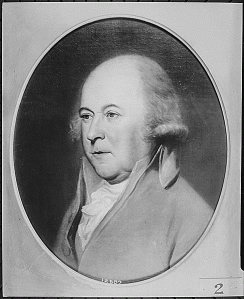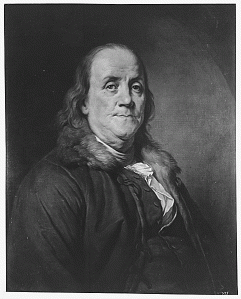Polly Baker one of several pseudonyms of Ben Franklin, to critique Societal Legal & Ethical Standards
seen as highly hypocritical by John Adams
seen as highly hypocritical by John Adams
Both esquires served this nation in the 18th C, though only one would likely survive the 21st Century
portraits courtesy of National Archives
portraits courtesy of National Archives
Polly Baker was a fictional eighteenth-century woman that conceived five children out of wedlock. “The Speech of Polly Baker” was written anonymously by Ben Franklin on the subject of illegitimate births, blameless fathers, chauvinistic judges, and juries. Franklin’s journal was delivered to numerous newspapers anonymously. “The Speech of Polly Baker” was published throughout the Colonies, though many publishers or readers had no idea of its real author.
With each published edition, Polly Baker pushed the fictitious district court into a conundrum that was resolved the fifth time in a most disrespectful manner. The judge ran off with Polly.
Here is a sample of the mockery of 18th Century law from Polly’s testimony.
I cannot conceive (may it please your Honours) what the Nature of my Offence is. I have brought Five fine Children into the World, at the Risque of my Life: I have maintained them well by my own Industry, without burthening the Township, and could have done it better, if it had not been for the heavy Charges and Fines I have paid. Can it be a Crime (in the Nature of Things I mean) to add to the Number of the King’s Subjects, in a new Country that really wants People?
This fictional account was first published in 1747. It was a century later that historians agreed that Franklin was the author. However, John Adams knew better.
None of Franklin’s pseudonyms were appreciated by John Adams. Below is Adam’s abridged thoughts in a letter to James Warren, from Paris on April 13, 1783. Adams was in Paris, along with Franklin and others, to negotiate the “Treaty of Paris” to end the Revolutionary War. His letter displayed a venomous contempt for Franklin’s effrontery to Puritan morality. Unfortunately, the two Americans were polarized in their approach to women.
"But You will form but an imperfect Idea after all of the Difficulties We have had to encounter, without taking into Consideration another Character equally selfish and interested—equally vain and ambitious—more jealous and envious, and more false & deceitful, I mean Dr. Franklin. It is a Saying of Algernoon Sidney concerning Sir Walter Rawleigh, that “his Morals were not sufficiently exact for a great Man”—And the Observation can never be applied with more propriety than to Dr. Franklin.— His whole Life has been one continued Insult to good Manners and to Decency. His Son, and Grandson, as he calls him with characteristic Modesty; the Effrontery with which he has forced these his offspring up in the World, not less than his Speech of Polly Baker, are Outrages to Morality & Decorum, which would never have been forgiven in any other American— These things however are not the worst of his Faults— They shew however the Character of the Man; in what Contempt he holds the Opinions of the World, and with what Haughtiness he is capable of persevering through Life in a gross & odious System of Falsehood and Imposture."[i]
John Adams persisted in this same letter laying on his disdain for Ben Franklin. Generally, Adam’s point of view was blunt even for that period. We wonder if John Adams had lived in the twenty-first century, with the likes of Jerry Springer, our tweeting President, and Murdoch's pulp fiction, would his view of Ben Franklin's social ridicule be so damning.
As best we know, Ben Franklin expressed his views about society using eleven[ii] or more pseudonyms. It is probable that anthropologists or social historians will reveal additional pennames. It is not likely we will ever know the reason he chose aliases. We do doubt that it was fear of Puritan prosecution or religious persecution.[iii] He already exposed himself by sunbathing in the nude and swimming naked in New England and the United Kingdom. His decision may merely have been practical, insulating his many successful enterprises from the backlash of society.
In the 18th Century, Ben Franklin could have been accused of slandering society at large. If hypocrisy was a crime, John Adams would probably have relished writing a legal brief targeting Ben Franklin. On the other hand, it is likely Abigail would have firmly suggested to her husband to just chill-out.
For further context on Polly Baker, the following is available from the Massachusetts Historical Society.
“The SPEECH of Miss POLLY BAKER, before a Court of Judicature, At Connecticut near Boston in New-England; where she was prosecuted the Fifth Time, for having a Bastard Child: Which influenced the Court to dispense with her Punishment, and induced one of her Judges to marry her the next Day,” see Franklin, Papers, 3:120–125. For a detailed account of its origins and history, see Max Hall, Benjamin Franklin & Polly Baker: The History of a Literary Deception, Chapel Hill, N.C., 1960. See also CFA's comment on Franklin and the “Polly Baker” piece in John Adam's, Works, 1:319–320.
From us;
Further reading; Ben Franklin’s exploits in the water
https://www.walkbostonhistory.com/history-blog/-the-unmasking-of-mrs-silence-dogood
https://www.walkbostonhistory.com/james-franklin.html
[i] http://www.masshist.org/publications/apde2/view?id=ADMS-06-14-02-0253.
[ii]Silence Dogood Caelia Shortface
Martha Careful Anthony Afterwit
Alice Addertongue Richard Saunders or Poor Richards
Benevolus Busy Body
Polly Baker Harry Meanwell
Timothy Turnstone
Provided by http://www.pbs.org/benfranklin/l3_wit_name.html
[iii] though he suffered some at the age of sixteen by being run out of Boston after publishing his 14 weekly letters criticizing Puritan society, via his brothers newspaper, as Silence Dogood, a widower.


